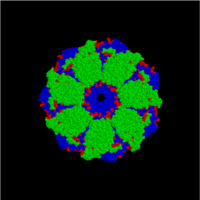
Measurement of Chaperone-Mediated Effects on Polyglutamine Protein Aggregation by the Filter Trap Assay.
Sign Up to like & getrecommendations! Published in 2018 at "Methods in molecular biology"
DOI: 10.1007/978-1-4939-7477-1_5
Abstract: The formation of aggregates by polyglutamine-containing (polyQ) proteins in neurons is a key to the pathogenesis of several progressive neurodegenerative diseases such as Huntington's disease (HD) spinocerebellar ataxias (SCAs), and spinal and bulbar muscular atrophy… read more here.
Keywords: trap assay; filter trap; chaperone; polyq ... See more keywords

Nuclear inclusions of pathogenic ataxin-1 induce oxidative stress and perturb the protein synthesis machinery
Sign Up to like & getrecommendations! Published in 2020 at "Redox Biology"
DOI: 10.1016/j.redox.2020.101458
Abstract: Spinocerebellar ataxia type-1 (SCA1) is caused by an abnormally expanded polyglutamine (polyQ) tract in ataxin-1. These expansions are responsible for protein misfolding and self-assembly into intranuclear inclusion bodies (IIBs) that are somehow linked to neuronal… read more here.
Keywords: protein; ataxin; stress; protein synthesis ... See more keywords

ANDROGEN RECEPTOR WITH SHORT POLYGLUTAMINE TRACT PREFERABLY ENHANCES WNT/β-CATENIN MEDIATED PROSTATIC TUMORIGENESIS
Sign Up to like & getrecommendations! Published in 2020 at "Oncogene"
DOI: 10.1038/s41388-020-1214-7
Abstract: Polyglutamine (polyQ) tract polymorphism within the human androgen receptor (AR) shows population heterogeneity. African American men possess short polyQ tracts significantly more frequently than Caucasian American men. The length of polyQ tracts is inversely correlated… read more here.
Keywords: tumorigenesis; short polyq; catenin; polyq tract ... See more keywords

The evolutionary history of the polyQ tract in huntingtin sheds light on its functional pro-neural activities
Sign Up to like & getrecommendations! Published in 2022 at "Cell Death and Differentiation"
DOI: 10.1038/s41418-021-00914-9
Abstract: Huntington’s disease is caused by a pathologically long (>35) CAG repeat located in the first exon of the Huntingtin gene ( HTT ). While pathologically expanded CAG repeats are the focus of extensive investigations, non-pathogenic… read more here.
Keywords: evolutionary history; huntingtin; polyq tract; tract ... See more keywords

Sis1 potentiates the stress response to protein aggregation and elevated temperature
Sign Up to like & getrecommendations! Published in 2020 at "Nature Communications"
DOI: 10.1038/s41467-020-20000-x
Abstract: Cells adapt to conditions that compromise protein conformational stability by activating various stress response pathways, but the mechanisms used in sensing misfolded proteins remain unclear. Moreover, aggregates of disease proteins often fail to induce a… read more here.
Keywords: polyq; response; stress response; protein aggregation ... See more keywords

Androgen receptor polyQ alleles and COVID‐19 severity in men: A replication study
Sign Up to like & getrecommendations! Published in 2022 at "Andrology"
DOI: 10.1111/andr.13339
Abstract: Ample evidence indicates a sex‐related difference in severity of COVID‐19, with less favorable outcomes observed in men. Genetic factors have been proposed as candidates to explain this difference. The polyglutamine (polyQ) polymorphism in the androgen… read more here.
Keywords: androgen receptor; covid severity; severity; polyq ... See more keywords

The 11S Proteasomal Activator REGγ Impacts Polyglutamine-Expanded Androgen Receptor Aggregation and Motor Neuron Viability through Distinct Mechanisms
Sign Up to like & getrecommendations! Published in 2017 at "Frontiers in Molecular Neuroscience"
DOI: 10.3389/fnmol.2017.00159
Abstract: Spinal and bulbar muscular atrophy (SBMA) is caused by expression of a polyglutamine (polyQ)-expanded androgen receptor (AR). The inefficient nuclear proteasomal degradation of the mutant AR results in the formation of nuclear inclusions containing amino-terminal… read more here.
Keywords: aggregation; viability; polyq expanded; motor ... See more keywords

Dynamics of a Protein Interaction Network Associated to the Aggregation of polyQ-Expanded Ataxin-1
Sign Up to like & getrecommendations! Published in 2020 at "Genes"
DOI: 10.3390/genes11101129
Abstract: Background: Several experimental models of polyglutamine (polyQ) diseases have been previously developed that are useful for studying disease progression in the primarily affected central nervous system. However, there is a missing link between cellular and… read more here.
Keywords: protein interaction; aggregation; network; disease ... See more keywords

Coaggregation of polyglutamine (polyQ) proteins is mediated by polyQ-tract interactions and impairs cellular proteostasis.
Sign Up to like & getrecommendations! Published in 2023 at "Acta biochimica et biophysica Sinica"
DOI: 10.3724/abbs.2023081
Abstract: Nine polyglutamine (polyQ) proteins have already been identified that are considered to be associated with the pathologies of neurodegenerative disorders called polyQ diseases, but whether these polyQ proteins mutually interact and synergize in proteinopathies remains… read more here.
Keywords: polyq proteins; mediated polyq; polyq tract; coaggregation ... See more keywords